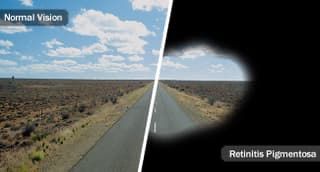Retinitis Pigmentosa
Retinitis pigmentosa (RP) is a term for a group of eye diseases that can lead to loss of sight. What they have in common are specific changes your doctor sees when they look at your retina -- a bundle of tissue at the back of your eye. When you have RP, cells in the retina called photoreceptors don't work the way they're supposed to, and over time, you lose your sight.
It's a rare disorder that's passed from parent to child. Only 1 out of every 4,000 people get it. About half of all people with RP have a family member who also has it.
The retina has two types of cells that gather light: rods and cones. The rods are around the outer ring of the retina and are active in dim light. Most forms of retinitis pigmentosa affect the rods first. Your night vision and your ability to see to the side go away.
Cones are mostly in the center of your retina. They help you see color and fine detail. When RP affects them, you slowly lose your central vision and your ability to see color.

Symptoms
Retinitis pigmentosa usually starts in childhood. But exactly when it starts and how quickly it gets worse varies from person to person. Most people with RP lose much of their sight by early adulthood. Then by age 40, they are often legally blind.
Because rods are usually affected first, the first symptom you may notice is that it takes longer to adjust to darkness (called "night blindness). For example, you may notice it when you walk from bright sunshine into a dimly lit theater. You may trip over objects in the dark or not be able to drive at night.
You may lose your peripheral vision at the same time or soon after your night vision declines. You may get "tunnel vision," which means you can't see things to the side without turning your head.
In later stages, your cones may be affected. That will make it harder for you to do detail work, and you may have trouble seeing colors. It's rare, but sometimes the cones die first.
You might find bright lights uncomfortable -- a symptom your doctor may call photophobia. You also may start to see flashes of light that shimmer or blink. This is called photopsia.
Bạn đang đọc truyện trên: AzTruyen.Top